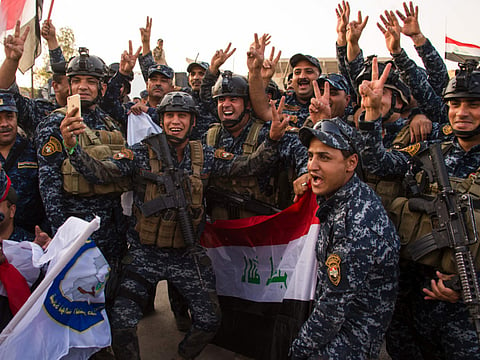Defeat of Daesh is necessary but not sufficient
The liberation of Mosul and the inevitable, approaching liberation of Raqqa in Syria, will not be the end of the terror outfit and its evil ideology

After months of tough urban combat, Iraqi Prime Minister Haider Al Abadi declared victory last Monday over Daesh (the self-proclaimed Islamic State of Iraq and the Levant) in its last strategic stronghold in Iraq. Iraqis celebrated in the streets, and the Americans should cheer as well.
The liberation of Mosul and the inevitable, approaching liberation of Raqqa in Syria, will not be the end of Daesh and its evil ideology, though. However, the group’s pretence to having an actual “state” has been crushed. As its surviving leaders scurry to the corners of the desert, no longer can they claim to head a winning movement. Their defeat diminishes the inspiration for violent extremists, or simply lost souls on social media, to launch attacks. This is a necessary step forward in combating terrorism.
The credit for liberating Mosul should go to the brave Iraqi forces who carried out the fight, as well as to the Kurdish peshmerga forces. But credit is also due to the superb execution by the United States and coalition forces.
Conducting the campaign in this way was strategically necessary to set the conditions for a truly lasting defeat of Daesh. An alternative would have been to use US ground forces from the get-go. But this would have ceded American military advantage to the enemy in the urban terrain of a foreign country, and it might also have induced some who are helping the campaign (or at least sitting on the sidelines) to join the enemy. Finally, it would have left the problem of post-conflict stabilisation and governance unresolved. History has shown this task is difficult for outsiders to accomplish.
Importantly, credit goes to my successor, Defence Secretary Jim Mattis, and Chairman of the Joint Chiefs-of-Staff, Joseph Dunford, for not only continuing this military campaign, but also continuing to seek ways to accelerate it. And then there are the superb military commanders: The US Central Command’s Joe Votel, campaign leaders Sean McFarland and Steve Townsend, and a host of others.
While there’s much to celebrate in the fall of Mosul, we also need to steel ourselves for the road ahead. The defeat of Daesh in Mosul and Raqqa is necessary, but not sufficient.
At this stage, I am less concerned about the military campaign in Iraq than the political and economic campaigns that must follow. Unless Iraqis are satisfied with what comes next, there will be a slide back to chaos and radicalism. I also believe that a sustained US military presence will be needed in order to improve Iraqi security forces and enable them to keep the peace. Coalition partners are essential: Italy, for example, is superb at training the police. Gulf Arab states can make a major contribution to lasting security in the region by providing critical economic assistance.
Syria will be even more complex. Among the most important decisions that the administration of United States President Donald Trump has taken is approving the provision of arms and training to Kurdish elements of the Syrian Democratic Forces (SDF) to lay siege to Raqqa. This was controversial because Turkey opposed such a move, but it is the only viable option for liberating Raqqa. While the final decision did not occur during the administration of former US president Barack Obama, I strongly supported backing the SDF, including the Kurds. Now, Daesh’s days in Raqqa are numbered. Going forward, however, it will be important that we continue to reassure Turkey, a Nato ally, by holding the SDF to its commitments.
Russia has played no constructive role in these impending US-led victories. President Vladimir Putin sent forces into western Syria under the pretence of fighting terrorism and inducing a political transition away from the murderous regime of Syrian President Bashar Al Assad. Putin did neither. Any broader US cooperation with Russia beyond deconflicting military operations will require Moscow to meet conditions that it has never met. The US should avoid being enticed by new Putin gambits along the same lines.
Elsewhere, and for some time to come, the fight against extremist terrorism will need to continue. In Afghanistan, for example, I was grateful to Obama for approving my and Dunford’s recommendations first to delay drawing down, and then to increase, the US forces advising and assisting Afghan forces and the government of President Ashraf Gani. I strongly support continuing efforts to improve security there. It’s not just that we cannot allow Afghanistan once again to become a base for attacking the US, but there’s also the upside of maintaining a security partnership in a region of strategic importance.
America will need to maintain its resolve to achieve a lasting defeat of Daesh. But for now, let’s thank the US troops and their commanders. Let’s thank the Iraqis and the Syrian forces taking on the terrorist group. The world should note that no country but the US could have led such a coalition to victory. That’s a fitting rejoinder to anyone who believes America’s internal disarray and partisan politics are reasons to doubt America’s staying-power.
— Washington Post
Ash Carter, US defence secretary from 2015 to 2017, is director of Harvard’s Belfer Center for Science and International Affairs and an MIT innovation fellow.



